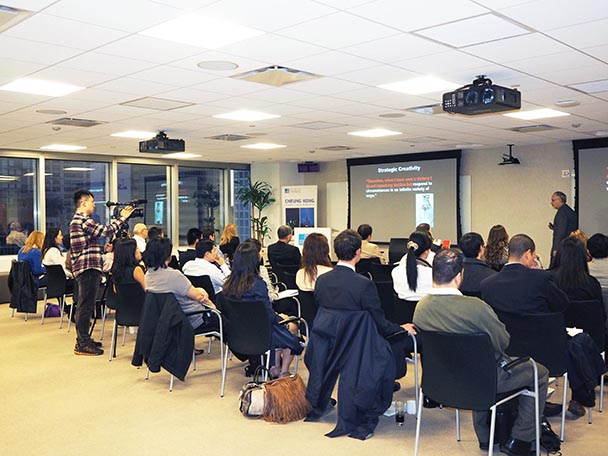Authors Apply Sun Tzu’s War Strategies to Business
“Know your enemy and know yourself.”
“Go where the enemy is not.”
“Every battle is won before it is ever fought.”
These concepts may have originated on battlefields in the East more than 2,400 years ago, but they belong in the boardrooms of today’s small and large businesses alike, according to authors Mark McNeilly and Becky Sheetz-Runkle.

Author Mark McNeilly lectures on “Sun Tzu and the Art of Business” April 22 at CKGSB’s New York office as part of the school’s Knowledge Series
McNeilly and Sheetz-Runkle explained how these ideas and many more from legendary Chinese warrior Sun Tzu translate to today’s business world during a lecture to more than 50 businessmen and businesswomen at the Cheung Kong Graduate School of Business New York office on April 22. The talk, titled “Sun Tzu and the Art of Business,” was part of CKGSB’s Knowledge Series, a monthly program featuring lectures and panel discussions on key topics around China and/or Asia.
Sun Tzu, as McNeilly and Sheetz-Runkle explained, was a Chinese general and military strategist for the smallest of seven warring states around 500 B.C. He was successful in turning that smallest state into the most powerful one. He outlined his war philosophy in a book titled The Art of War, which is now one of the most important military treatises in Chinese history.
Studied by Eastern militaries for generations, The Art of War was first translated in the 18th century by a Jesuit missionary in the West, where it has also become standard military reading. Given the similarity between battles among armed forces for land and competition among businesses for market share, the text is now standard reading in business schools around the world. The Art of War has gained popularity with the general American public thanks to notable mentions in the 1987 classic film Wall Street and in HBO’s famed TV drama The Sopranos.

Author Becky Sheetz-Runkle addresses an audience of more than 50 businesspeople who gathered to hear insights on “Sun Tzu and the Art of Business.”
McNeilly and Sheetz-Runkle discussed key principles from the The Art of War that have practical and direct application to the world of business. McNeilly geared his advice to all businesses large and small, while Sheetz-Runkle specifically addressed how small businesses and entrepreneurs can apply Sun Tzu’s advice.
“The Art of War is very much written from the perspective of how can a small player, a small military, a small force become a dominant player, a battlefield leader, or in our case, a business leader, Sheetz-Runkle said. Their presentation cited many examples of successes and failures by modern companies to show these principles in action or, as the case may be, inaction. Among the key principles and examples they discussed:
Turn disadvantage into advantage.
The Art of War is “a text about being proactive, about being offensive; not about being defensive and waiting and seeing. It’s about taking initiative, it’s about taking advantage of every opportunity,” Sheetz-Runkle said.
This underlying theme is very much applicable to small businesses, she said.
Greek yogurt leader Chobani, for example, turned their disadvantage of being a “little guy” into an advantage by celebrating their small business culture in their TV advertisements. Today they’ve captured 17 percent of the yogurt market when Greek yogurt wasn’t even a piece of the pie in 2007.
Know your enemy and know yourself.
This point speaks to the importance of gathering foreknowledge about your competitors, your customer and yourself. While this idea is one of Sun Tzu’s most famous, the emphasis is usually on knowing your enemy and not on knowing yourself, McNeilly explained.
Knowing yourself is equally important. McNeilly introduced McDonald’s failed entry into the European luxury hotel market that ended in 2003 as an example of the importance of knowing yourself. McDonald’s forgot who they were: a fast-food brand known for affordability. In no way could that align with the concept of a high-end hotel. Additionally, in Germany, where their hotel was named “The Golden Arch Hotel,” the word “arch” is slang for a person’s posterior.
During the post-lecture Q&A with the audience, Sheetz-Runkle also shared insight about how businesswomen can utilize Sun Tzu’s advice by knowing their strengths. She described her experience of frustration while practicing karate, where brute force rules, as well as her success practicing jujitsu, where redirection and strategy is key. Sun Tzu invites women to ask, “Why go force on force when you can outsmart, out-strategize, out-think?” Sheetz-Runkle said.
Have a beginner’s mind.
A beginner often sees solutions and opportunities that the expert does not. Cirque du Soleil found success by viewing the circus industry through a beginner’s eyes. “Cirque du Soleil looked at two things: What were customers really willing to pay for and how can we reduce cost?” McNeilly said.
First, they got rid of the circus animals—this reduces costs as well as eliminates the concern people may have for the well-being of performing animals. Then, they reduced the number of circus tents from three to one. Next, they elevated key attractions higher than the industry standard: investing in one really beautiful tent and more sophisticated clowns, and introducing acrobatic artistry and dramatic storylines.
Create unity.
Using Sun Tzu’s advice, companies should strive to have a unified brand, theme and mission, Sheetz-Runkle said. Given that it is easier to build a consensus among a smaller group of employees, this is where smaller companies should have an advantage. “What must unite you is the dire consequences of losing,” Sheetz-Runkle said.
Online shoe retailer Zappos, Sheetz-Runkle said, started off with a singular focus on creating a culture of exceptional customer service with passionate employees and customers. They wanted to have a group of people so committed to being there that they offered their employees a $2,000 quitting bonus, with the thinking being that, “If you’d rather have the $2,000 today than the opportunity to be part of something bigger than you and to work for this organization, then we’d rather not have you,” Sheetz-Runkle explained.
Amazon bought Zappos in a deal valued at more than $1.2 billion in 2009.
Go where the enemy is not.
This goes hand-in-hand with the concept of avoiding attacking an enemy’s strengths and focusing on weaknesses. Striking the competition where it is most vulnerable, often through indirect methods, is crucial. “Sun Tzu said that just as water takes the path of least resistance, you need to take the path of least resistance in your strategy,” McNeilly said.
McNeilly cited the success of Netflix to illustrate this point. Frustrated by a $40 late fee on a copy of Apollo 13, Netflix founder Reed Hastings developed a rental model that is entirely different from the model used by Blockbuster and other brick-and-mortar stores. By creating the new mail-based method of renting movies without late fees, Netflix won without ever fighting Blockbuster directly. “The question is not how do you take on the opponent directly, but rather win without fighting?” McNeilly said.
Other “category creators” who created niche markets for themselves include: Samuel Adams, a premium microbrew American beer; Chobani, Greek yogurt for American consumers; and single-subject cable channels like CNN, ESPN, MTV and FOX News.
Adapt and vary your plans.
Success can hinge on remaining open to unexpected changes in course.
Sheetz-Runkle shared the example of PayPal, which went through five major concept changes in its first fifteen months before landing on its current business model. In just under four years from the time they began, there were bought by eBay for $1.5 billion in 2002.
Move swiftly to overcome the opposition.
“Speed allows you to bring products to market more quickly, exploit opportunities and build momentum, keep the competition off balance, and reduce your resources,” McNeilly said. GM’s Saturn project tried to combat the Japanese auto market in the small car category, but it took a total of ten years for them to have their first car roll off the lines, which proved to be too late.
To speed up your decision-making cycle time, McNeilly suggested employing the so-called “OODA” loop – “Observe, Orient, Decide and Act” – which helped American pilots outperform their enemy during the Korean War despite their planes being inferior. “You need to think about, ‘What’s my OODA loop as a business? How do I shorten that?’ ” McNeilly said.
Maneuver for growth.
Sun Tzu is not about holding your ground, but about being proactive and assertive, Sheetz-Runkle said.
Looking again at Netflix as an example, the company split in two when it launched a streaming service that essentially competed against its DVD service, letting the customers decide which one they wanted.
“What we see too often in business, and what’s a losing strategy, is holding on to what’s not working because it’s what we’re tied to, it’s what we know, and it’s what’s worked in the past,” Sheetz-Runkle said. Netflix was able to grow as customers transitioned from DVDs to streaming because it allowed itself to move away from its original mission.
Lead by example.
Among the qualities Sun Tzu described a good leader possessing was courage. McNeilly shared the story of Aflac CEO Dan Amos, who sought to build name recognition for his then unknown insurance company. He poured millions into developing an ad campaign to do so. His courage to feature a quacking duck—an unconventional choice for an insurance company—proved to be very successful as his company’s name recognition surged into the 90-percent range in the years following the duck’s debut.
For more information about McNeilly and Sheetz-Runkle, visit Sun Tzu Strategies. Mark McNeilly is the author of Sun Tzu and the Art of Business: Six Strategic Principles for Managers, while Becky Sheetz-Runkle has written The Art of War for Small Business: Defeat the Competition and Dominate the Market with the Masterful Strategies of Sun Tzu and Sun Tzu for Women: The Art of War for Winning in Business.